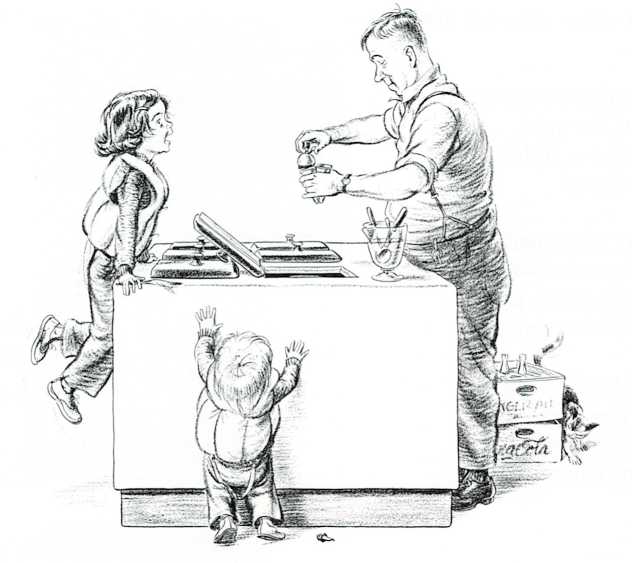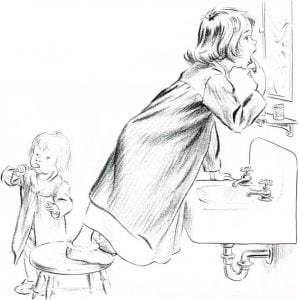One Morning in Maine
written and illustrated by Robert McCloskey
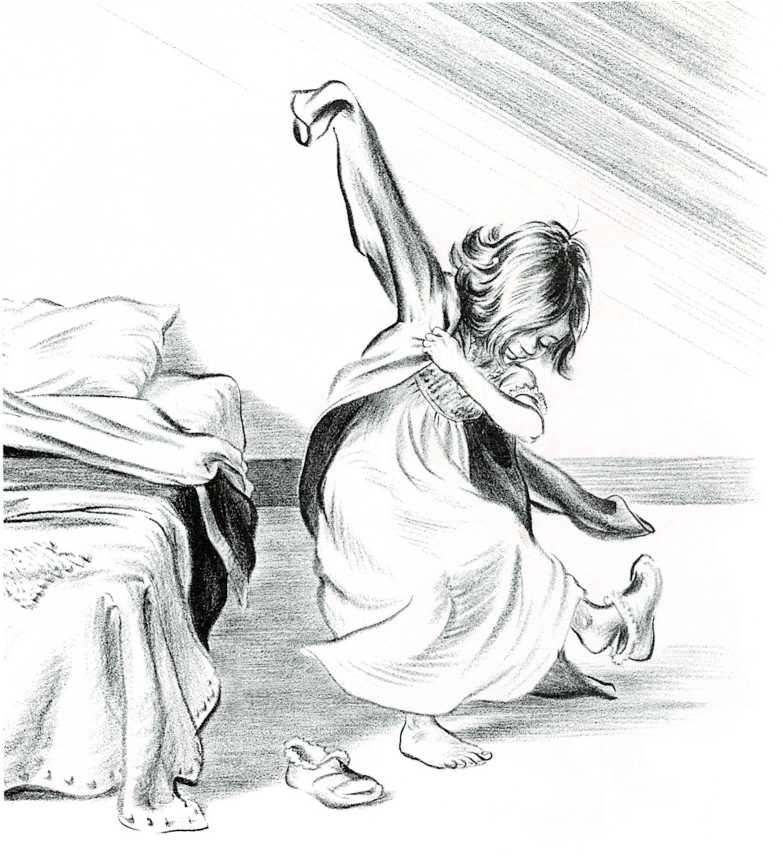
Sister Jane had wiggled out of her nightie, so Sal helped her put on her
robe and slippers. “You don’t want to catch cold and have to stay in
bed, Jane, because this morning we are going to Buck’s Harbor,” Sal
reminded her sister.
Together they went into the bathroom to get ready for breakfast. Sal
squeezed out toothpaste on sister Jane’s brush and said, “Be careful,
Jane, and don’t get it in your hair.”
Then she squeezed some toothpaste on her own brush and when she started
to brush her teeth something felt very strange! One of her teeth felt
loose! She wiggled it with her tongue, then she wiggled it with her
finger.
“Oh, dear!” thought Sal. “This cannot be true!” Standing on the stool,
she looked in the mirror and wiggled her tooth again. Sure enough, it
was loose! You could even see it wiggle.
“Ma-a-a-ma!” she cried. “One of my teeth is loose! It
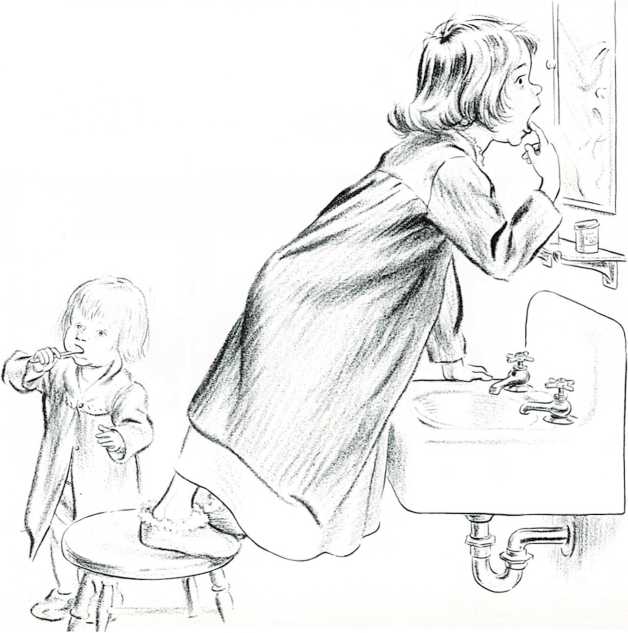
will hurt and I’ll have to stay in bed! I won’t be able to eat my
breakfast and go with Daddy to Buck’s Harbor!” She came running down the
stairs and into the kitchen.
“Why, Sal,” said her mother, “that’s nothing to worry about. That means
that today you’ve become a big girl. Everybody’s baby teeth get loose
and come out when they grow up. A nice new bigger and better tooth will
grow in when this one comes out.”
“Did your baby teeth get loose and come out when you grew to be a big
girl?” Sal asked her mother.
“Yes,” she answered. “And then these nice large ones grew in. When Penny
grew to be a big dog, his puppy teeth dropped out too.”
“And will Jane’s get loose too?” asked Sal.
“Yes,” said her mother. “But not for a long time, not until she stops
being a baby and grows up to be a big girl like you. Jane is so young
that she hasn’t even grown all her baby teeth yet. Now let’s all go
upstairs and brush our hair and get dressed for breakfast.”
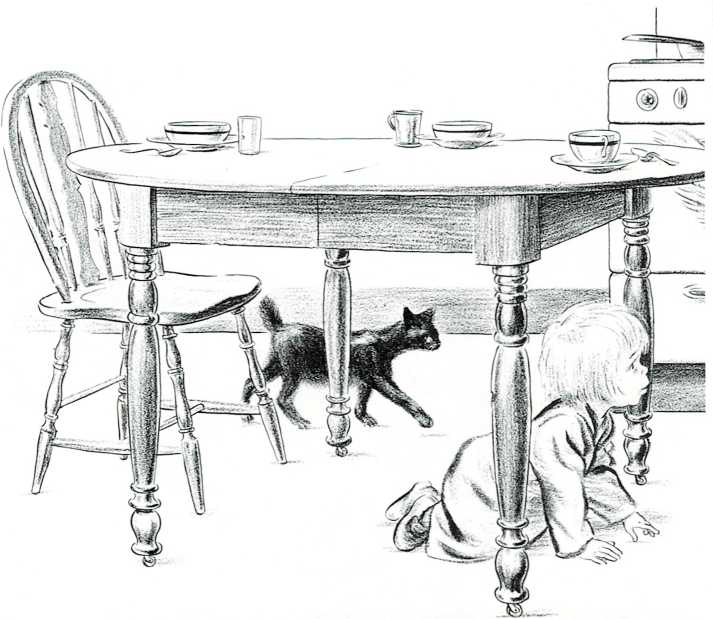
“It feels so different to be a big girl and have a loose tooth,” said
Sal, “especially when you are chewing. When is it going to come out?”
“Perhaps today, perhaps tomorrow,” answered her mother. “But when your
tooth does come out, you put it under your pillow and make a wish, and
your wish is supposed to come true.”
“I know what I’m going to wish for!” said Sal. “A nice cold choco—“
“But you mustn’t tell anybody your wish, or it won’t come true,”
cautioned her mother. “It’s supposed to be a secret wish. Now finish
your milk, Sal; then you can go out on the beach and help your father
dig clams for lunch.”
“I’m a big girl, and I can help him dig a lot of clams, fast,” said Sal,
“so we can hurry up and go to Buck’s
Harbor.”
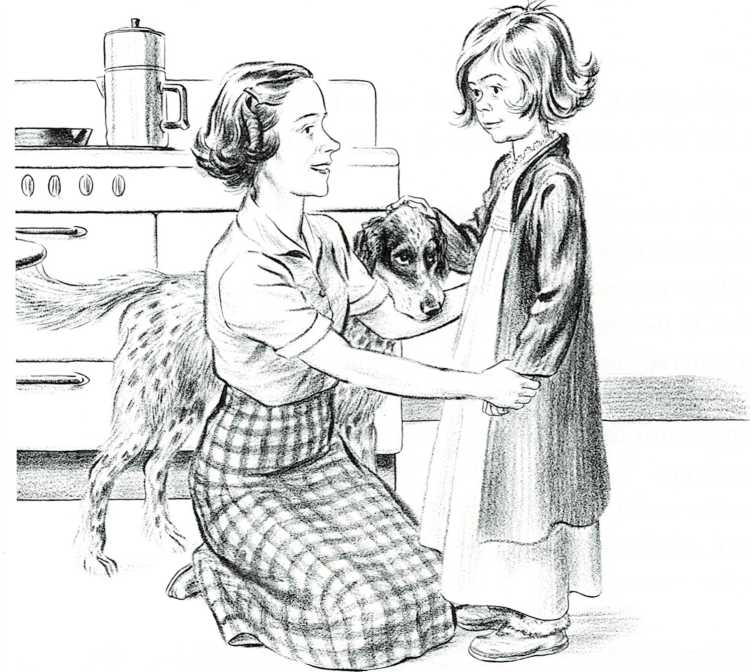

After breakfast, when Sal went out to help her father, she saw a fish
hawk flying overhead, carrying a fish.
“I have a loose tooth!” Sal called up to the fish hawk. The fish hawk
flew straight to her nest on top of a tree without answering. She was
too busy feeding breakfast to her baby fish hawk.
Sal wondered for a moment if the baby fish hawk had any teeth to chew
his breakfast. Then she started on down toward the beach where her
father was digging clams.
When she came near to the water she saw a loon.
“I have a loose tooth!” Sal called to the loon. “And today I have
started to be a big girl.”
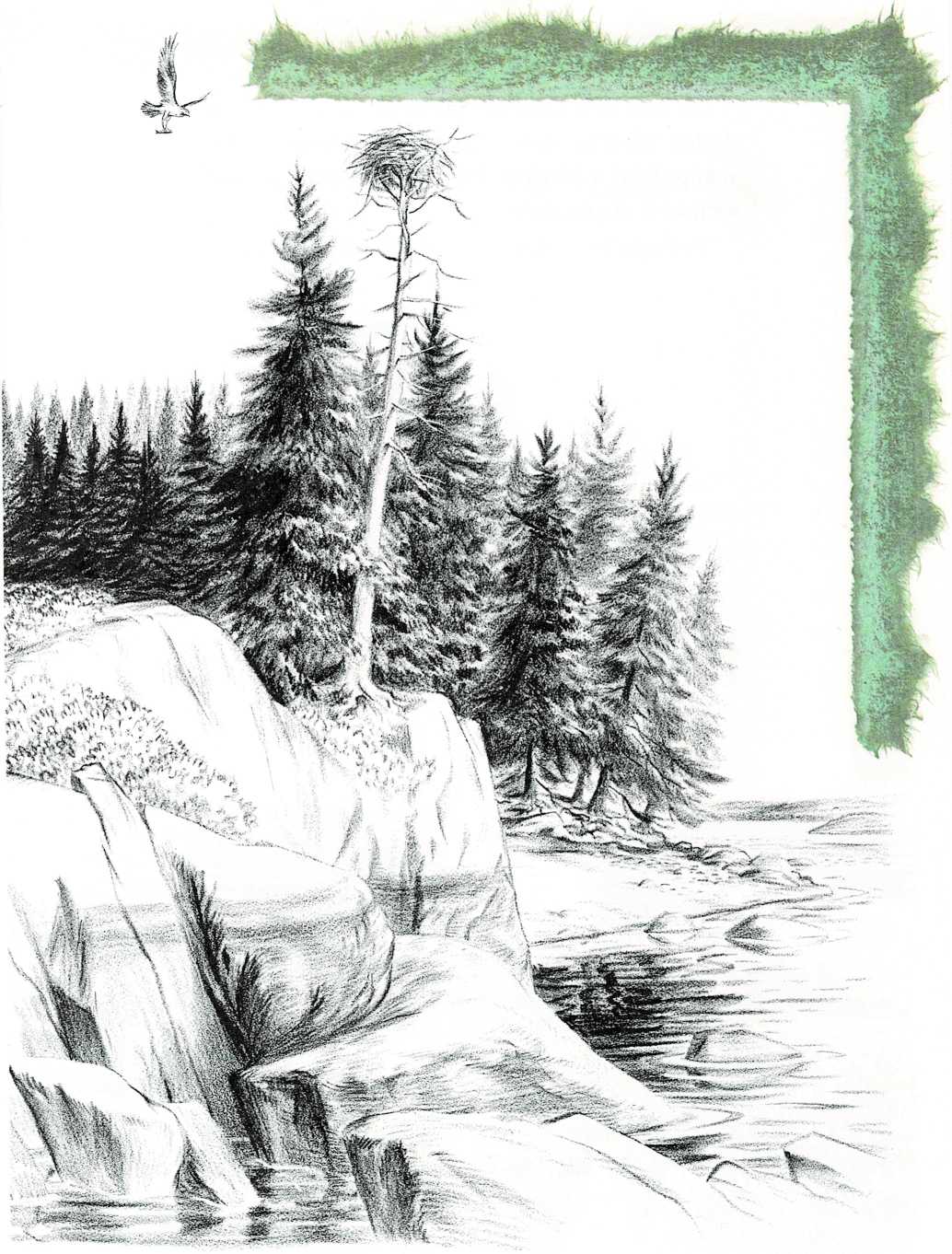
The loon didn’t say anything but kept swimming in circles. Then he
ducked his beak in the water and snapped out a herring. Then he
swallowed it whole, without a single chew.
“Perhaps loons don’t have teeth,” thought Sal, and she was just turning
to go on her way when a seal poked his head up out of the water.
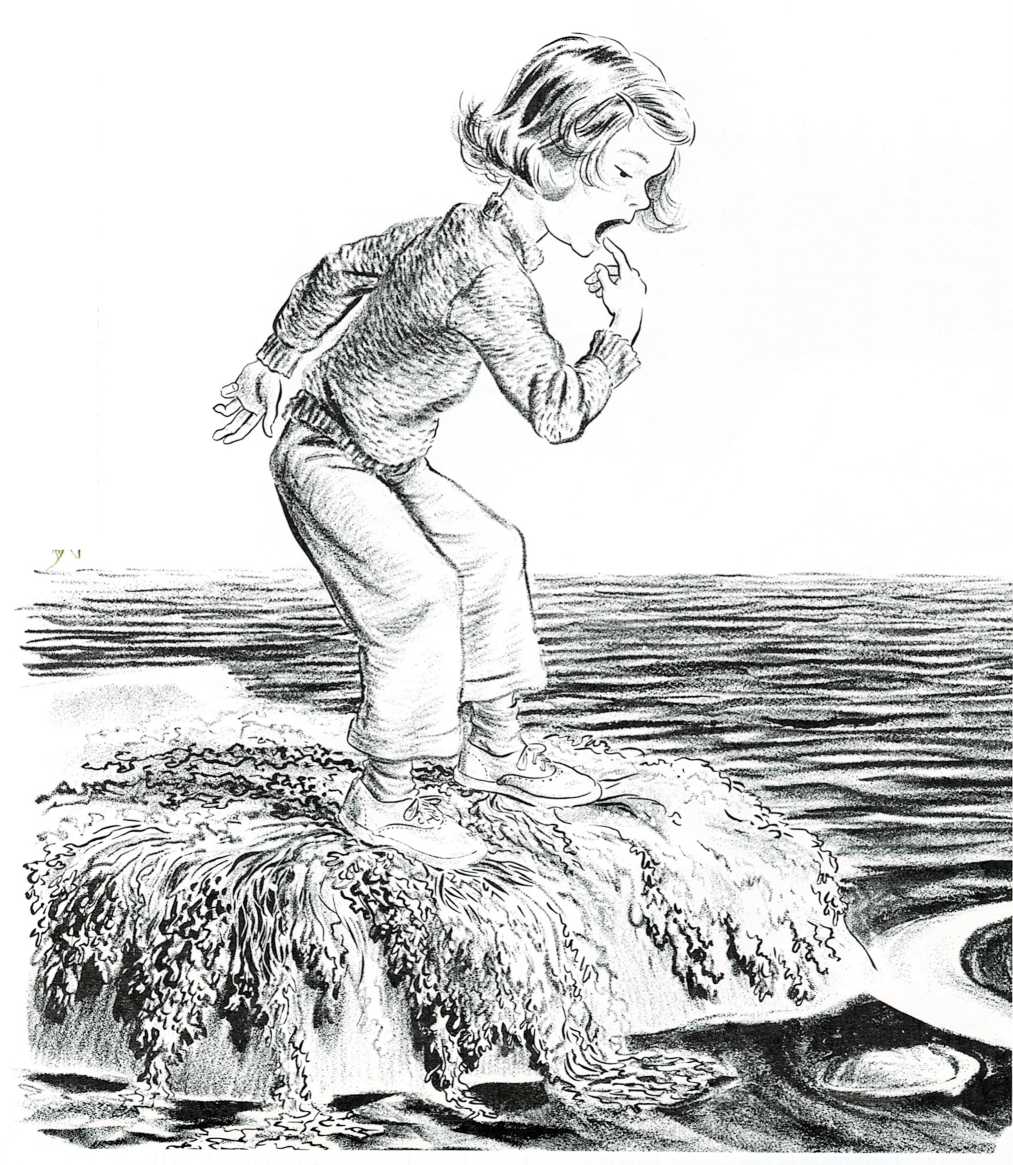
“I have a loose tooth!” Sal said to the seal, and the seal, being just
as curious as most seals, swam nearer to have a good look.
“See?” said Sal, and she walked closer, right down onto the slippery
seaweeds at the water’s edge.
The seal swam nearer, and Sal was stooping nearer when O-O-Oops! she
slipped on the seaweed and fell kasploosh!
The seal disappeared beneath the water and the loon laughed,
“Luh-hoo-hoo-hoo-hoo-hooh!”
Sal wasn’t hurt a bit, so she laughed too, then she got up carefully and
started on down the shore to help her father dig clams.
She paused to w^r^atch some sea gulls having breakfast. They were
dropping mussels down on a rock to crack the mussel shells, just like
nuts. Then they flew down to eat the insides.
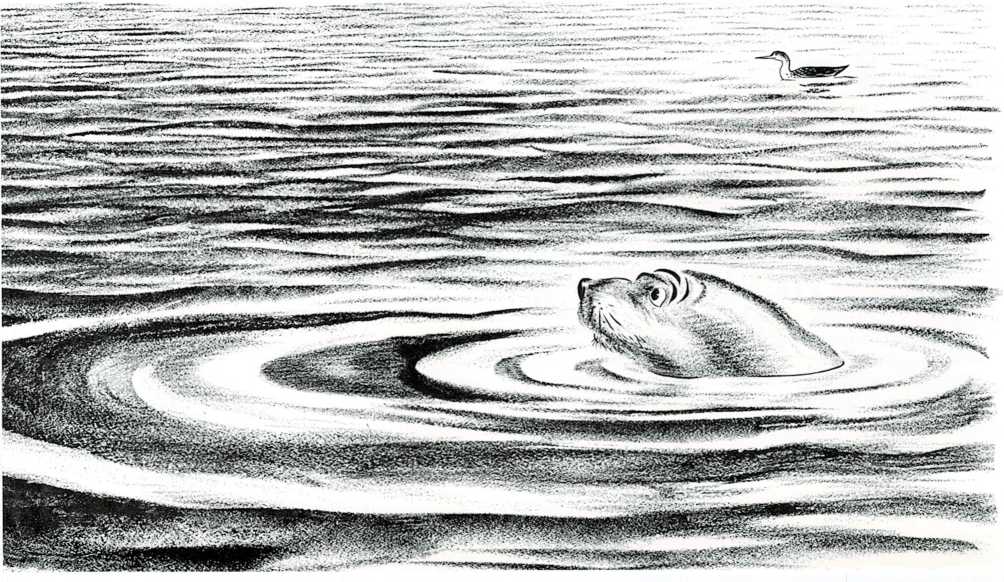
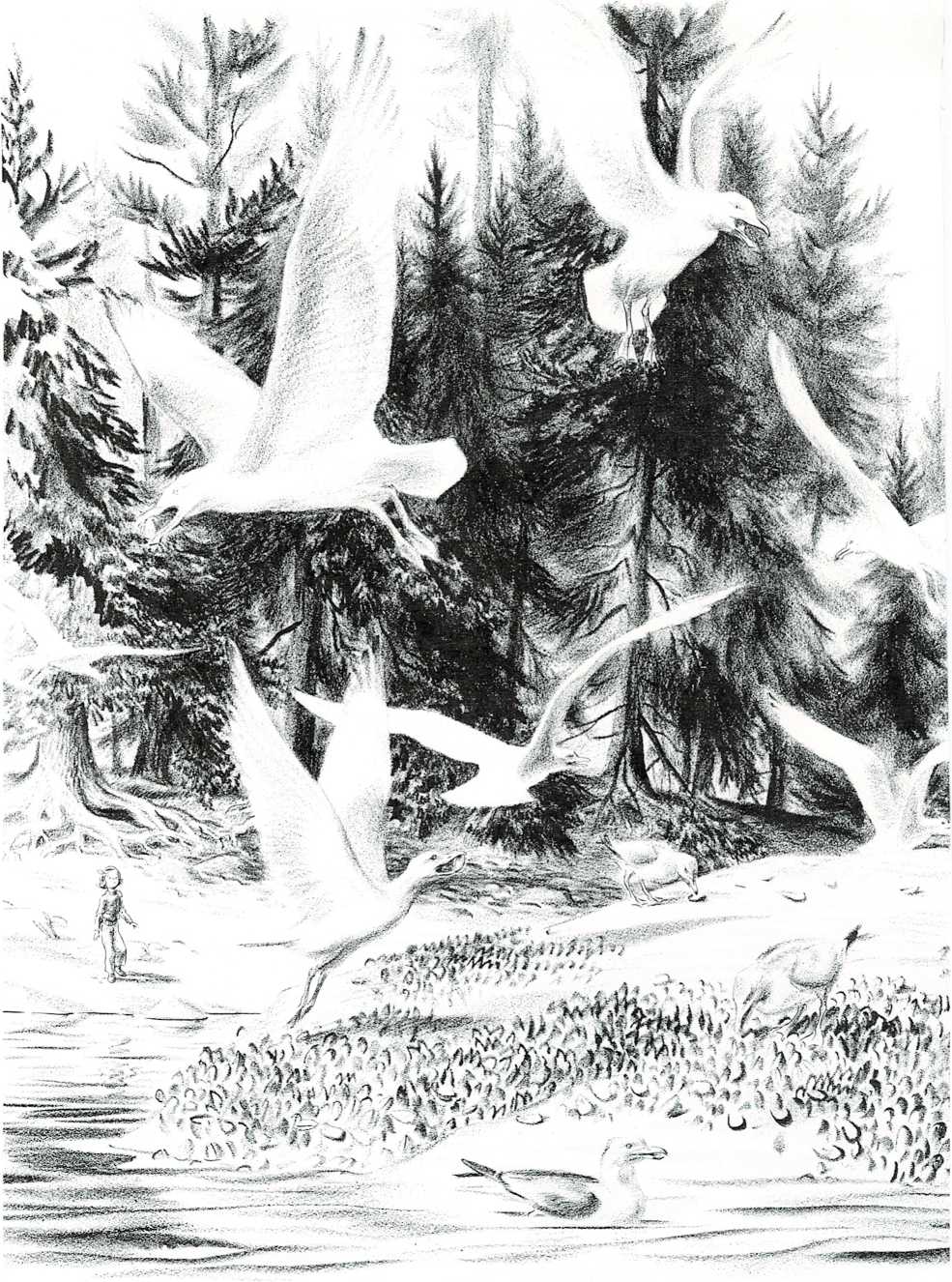
“Do sea gulls have teeth?” wondered Sal as she wiggled her own loose one
with her tongue. She thought of her secret wish and smiled, then hurried
down the beach to where she could see her father.
“Daddy! I have a loose tooth!” she shouted. “And when it drops out I’m
going to put it under my pillow and wish a wish. You can even see it
wiggle!”
Her father stopped digging clams to watch while Sal wiggled her tooth
for him. “You’re growing into a big girl when you get a loose tooth!” he
said. “What are you going to wish for when it drops out?”

“I can’t tell you that,” said Sal solemnly, “because it’s supposed to be
a secret wish.”
“Oh, yes, so it is,” her father agreed.
“May I help you dig clams?” Sal asked.
“I’m almost finished,” he replied, “but you can help if you like. First,
you must take off your shoes and socks, and roll up your pants too, so
that they won’t get all wet and muddy.”
Sal took off her shoes and socks and put them on a dry rock. She rolled
up her pants and waded into the muddy gravel to help her father. He dug
in the mud with his clam rake, and then they looked carefully and felt
around in the muddy hole for clams.
“I found a tiny baby one!” said Sal.
“You certainly did,” said her father. “But it’s too small. We just keep
the large ones, like this. Let’s put the baby clam back in the mud so he
can grow to be a big clam someday.”
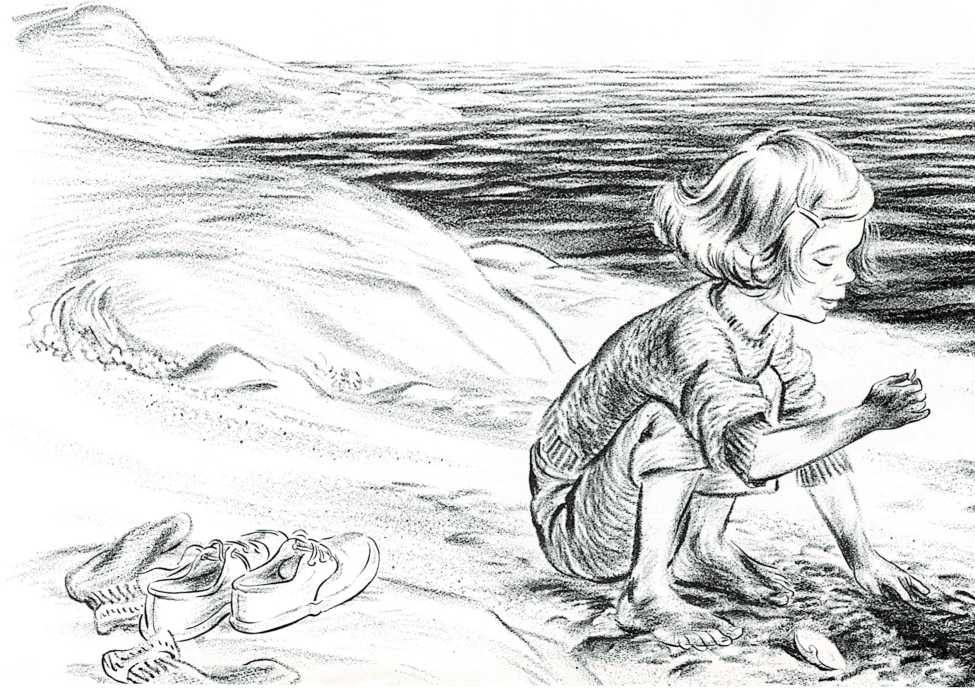
“He is such a baby clam, and I guess he is too small,” she agreed.
“I guess he isn’t even big enough to have all his baby teeth,” said Sal,
placing the tiny clam tenderly back in the mud.
“Clams don’t have teeth,” grunted her father, digging another rakeful of
mud.
“Not even big clams have teeth?” asked Sal.
“Not even big clams,” her father assured her.
“Do baby fish hawks and big fish hawks have teeth?” asked Sal.
“No,” said her father.
“Do loons have teeth?” she asked, “and gulls?”
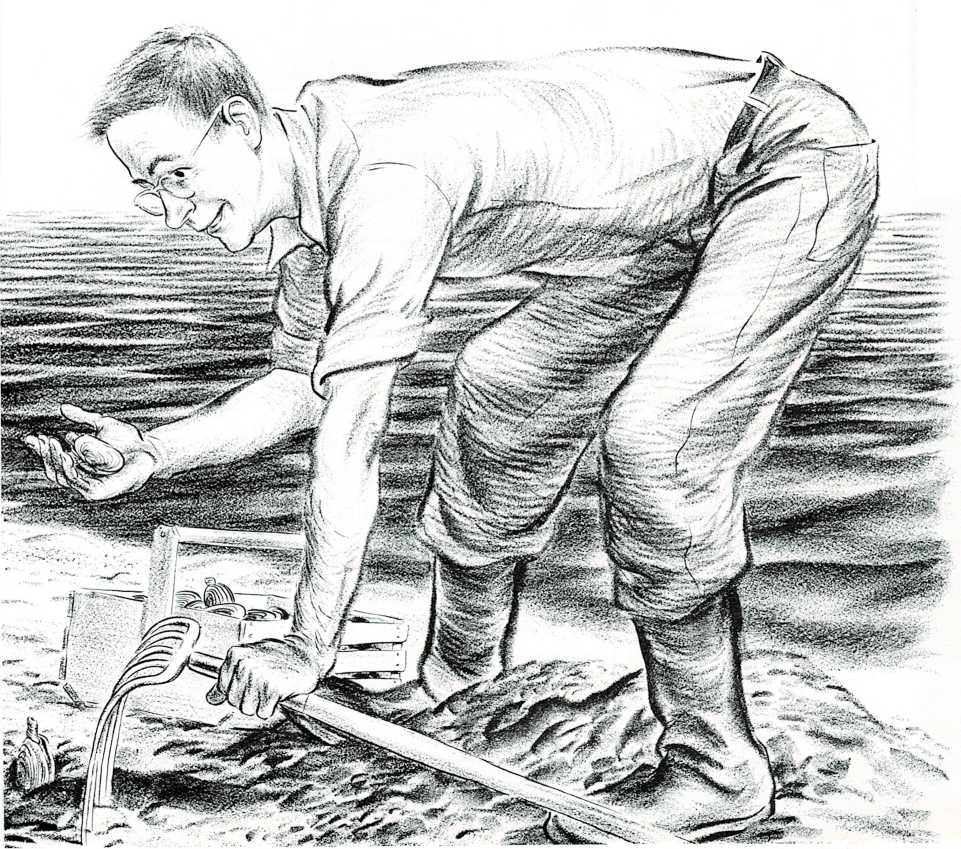
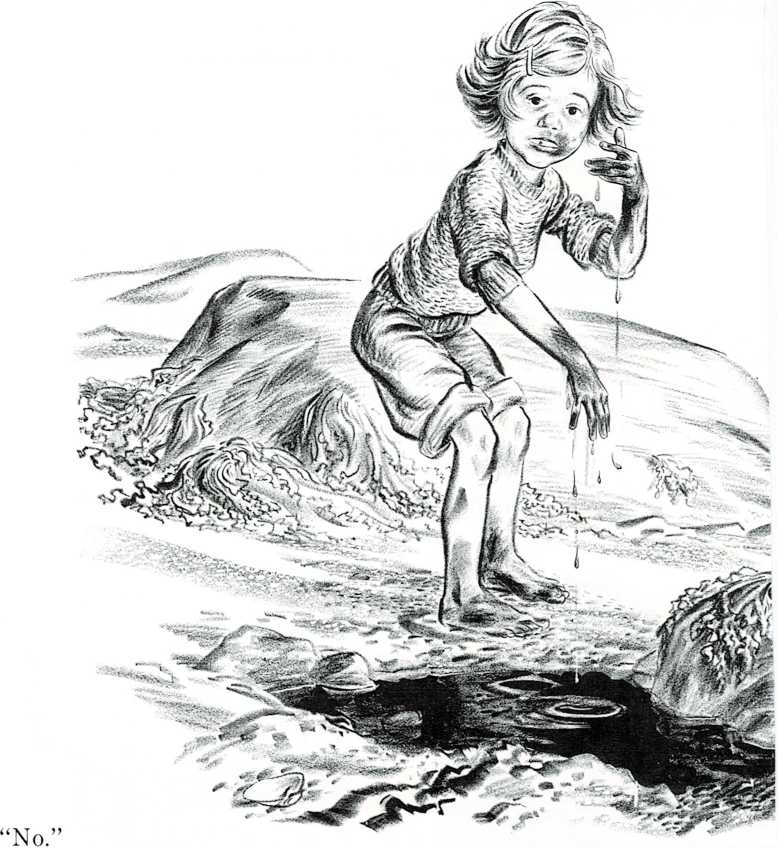
“Do seals have teeth?”
“Yes, they have ’em,” he answered.
“And do their teeth get loose like this?” asked Sal, opening her mouth
to show her loose tooth.
“O-owh!” she said with great surprise. She felt with her tongue, and she
felt with her muddy fingers.
“Why it’s gone!” she said sadly, feeling once more just to make sure.
The loose tooth was really and truly gone. The salty mud from her
fingers tasted bitter, and she made a bitter-tasting face that was
almost a face like crying.
“Did you swallow it, Sal?” her father asked with a concerned smile.
“No.” She shook her head sadly. “I was too busy asking to do any
swallowing. It just dropped itself out. It’s gone, and I can’t put it
under my pillow and make my wish come true!”
“That’s too bad,” her father sympathized. “But you are growing into a
big girl, and big girls don’t cry about a little thing like that. They
wait for another tooth to come loose and make a wish on that one.”
“Maybe we can find my tooth where it dropped,” said Sal, hopefully
feeling around in the muddy gravel where the clams live.
Sal’s father helped her look, but a muddy tooth looks so much like a
muddy pebble, and a muddy pebble looks so much like a muddy tooth, that
they hunted and hunted without finding it.
“We’ll have to stop looking and take our clams back to the house, Sal,”
her father said at last, “or we won’t have time for the trip to the
village.” He washed off the clams in the clean salt water of the bay,
and Sal reluctantly stopped looking and waded in to wash the mud from
her feet and hands.
“I guess some clam will find my tooth and get what I wished for,” said
Sal. “If we come back here tomorrow and find a clam eating a chocolate
ice-cream cone, why, we’ll have to take it away from him and make him
give my tooth back too,” she said.
While Sal put on her socks and shoes her father packed seaweed around
the clams to keep them moist and fresh.
“Now, let’s hurry back to the house,” he said, “and in a few minutes
we’ll be on our way to Buck’s Harbor in the boat to get milk and
groceries.”
“Okay,” Sal answered, scrambling to her feet.
She gave one last look at the muddy place where she’d lost her tooth and
then started walking back along the shore with her father. She walked
along slowly, looking at her feet so that her father could not see her
face, in case it looked almost like crying.
“Oh! See what I’ve found!” she exclaimed, stooping to pick up a feather.
“It’s a gull’s feather,” said her father, pausing for Sal to pick it up.
“Did a gull lose it? Will another feather grow in where this one dropped
out?” asked Sal.
“Yes, Sal, that’s right,” answered her father.
“Maybe sea gulls put dropped-out feathers under their pillows and wish
secret wishes,” Sal suggested.
“Sea gulls don’t use pillows, but I suppose they can make wishes,” her
father said.
“Then I’ll make my wish on this feather,” Sal decided.
“Perhaps the sea gull has already made a wish on that feather and the
wish is used up,” suggested her father.
“Oh, no,” Sal said definitely, “he didn’t, you see. I guess because he
was too busy flying and not looking back. He didn’t notice it was loose
when he brushed his feathers this morning, so he didn’t expect it would
drop out. He doesn’t even know it’s gone,” she convinced herself. She
closed her eyes tight and wished her secret wish.
When they reached home Sal’s mother and sister Jane were waiting with a
box of empty milk bottles to return to the store and a list of things to
buy.
“I’ll have a nice clam chowder ready for your lunch
when you get back,” said Sal’s mother, waving good-by.
“I’ll take good care of Jane,” Sal promised. “I’m a big girl and I can
watch so she doesn’t tumble into the water.”
Sal and Jane and their father went down to the shore and got aboard
their boat.
Sal and Jane put on their life preservers while their father prepared to
start the outboard motor. He pulled and he pulled on the rope to start
it, but the outboard motor just coughed and sputtered and wouldn’t
start.
So he had to row the boat all the way across the bay to Buck’s Harbor
where the store was.
The harbor was full of boats, and Sal’s father rowed their boat among
them, up to a landing, and tied it so it would not drift away while they
were at the store. They all climbed ashore, and Sal’s father brought
along the milk bottles. He brought the outboard motor too, so Mr. Condon
who ran the garage could fix it.
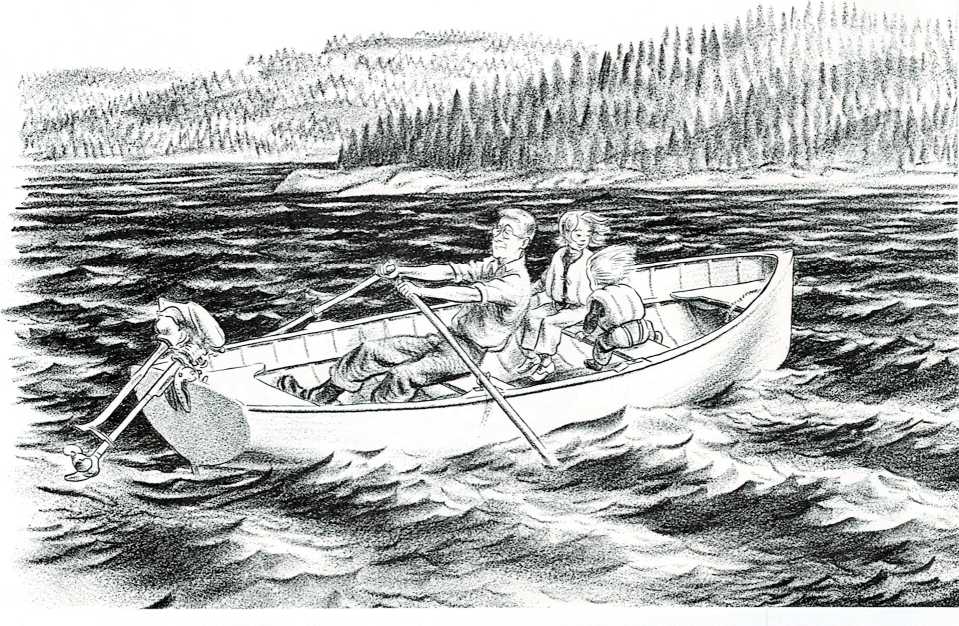
As they came up the path to the village Mr. Condon was outside his
garage, putting gas into a car.
“I have a tooth out!” Sal greeted. “And our outboard motor won’t run.”
“My, such trouble!” Mr. Condon commented, and after he had admired the
empty place where Sal’s tooth was missing they took the outboard motor
into the garage to find why it wouldn’t run. Mr. Condon pinched a little
with his pliers, tunked a bit with his hammer, and then, after selecting
a large wrench, he took out the spark plug.
“Came right out, just like that tooth of yours, didn’t it, Sal?” he
said, holding it up to the light. “Humph!” he grunted, tossing it on the
floor. “Needs a new plug!”
Sal was just about to ask how long it would take for a new spark plug to
grow in when Mr. Condon reached

up on the shelf and picked out a brand-new one, and put it in the motor.
Sal picked up the old spark plug and handed it to sister Jane. Jane was
so little that she didn’t understand about secret wishes. Jane was so
little that she couldn’t even say ice-cream cone! So Sal wished the
secret wish for Jane on the spark plug.
Mr. Condon pulled the rope, and the motor started right up, just as good
as new. Sal’s father thanked him and picked up the motor and the milk
bottles. Jane carried her spark plug, Sal carried her feather, and they
said good-by and walked across the street to where Mr. Condon’s brother
kept store.
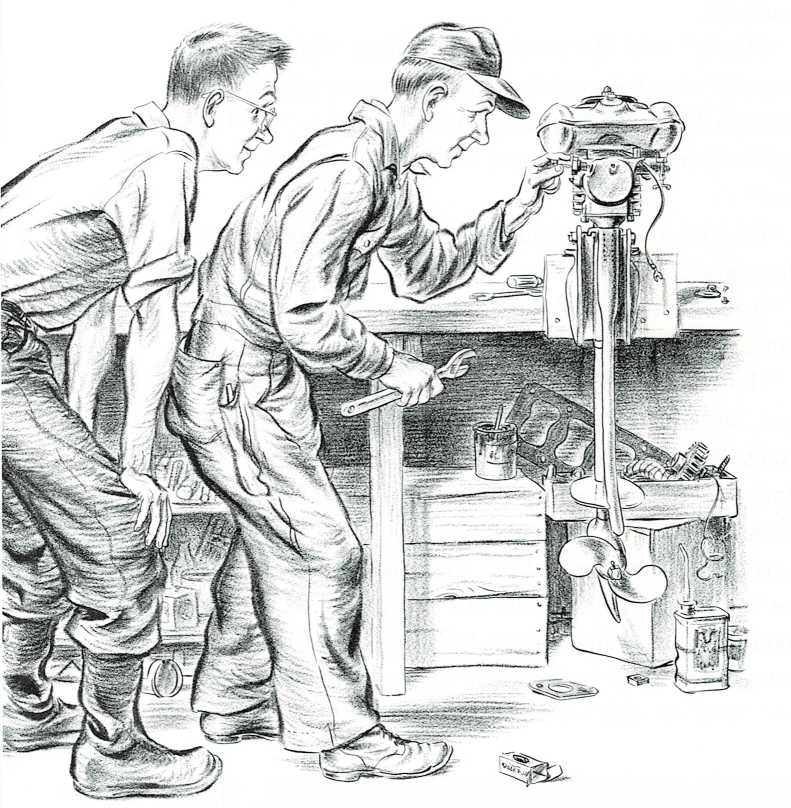
“Well, look who’s here!” said the Mr. Condon who kept store.
“I have a tooth out!” Sal shouted, returning Mr. Condon’s greeting.
She showed the empty place where her tooth had been, first to Mr.
Condon, then to Mr. Ferd Clifford and Mr. Oscar Staples, who were
sitting in the store talking about trapping lobsters and how the fish
were biting.
“Don’t put your tongue in the empty place,” Mr. Clifford advised, “and a
nice shiny gold one like mine will grow in.”
“But I didn’t know soon enough,” said Sal, looking confused.
“Hawh!” said Mr. Condon, chuckling. “Don’t you go worryin’ about
everything these jokers suggest. I don’t suppose,” he added, opening up
his freezer, “that you could eat an ice-cream cone with one of your
teeth out?”
“Oh, yes, I could!” said Sal. “And it’s supposed to be chocolate!”
“And this little lady?” he questioned, turning to Jane.
“Hers is supposed to be vanilla, so the drips won’t spot, and you’d
better push it together tight, so it won’t drop off,” Sal dictated,
“because she’s still almost a baby and doesn’t even have all of her
first teeth.”
After Mr. Condon had put the groceries and milk in the box, they thanked
him once more and waved good-by. They walked down the path to the harbor
and down the runway to the float where their boat was tied. They all
climbed aboard, carrying the outboard
motor, the box of milk and groceries, the feather, the spark plug, and
the ice-cream cones.
While their father fastened the outboard motor to the boat Sal and Jane
finished their ice-cream cones.
“I want s’more!” Jane demanded.
“Silly!” exclaimed Sal. “Our wishes are all used up.” Then she
remembered that she was growing up, and just like a grownup she said,
“Besides, Jane, two ice-cream cones would ruin your appetite. When we
get home we’re going to have CLAM CHOWDER FOR LUNCH!”
Sal has other adventures in Blueberri\’es for Sal, which is also by
Robert McCloskey. In this story, Sal and her mother go to pick
blueberries in the Maine woods and meet a mother bear and her cub
